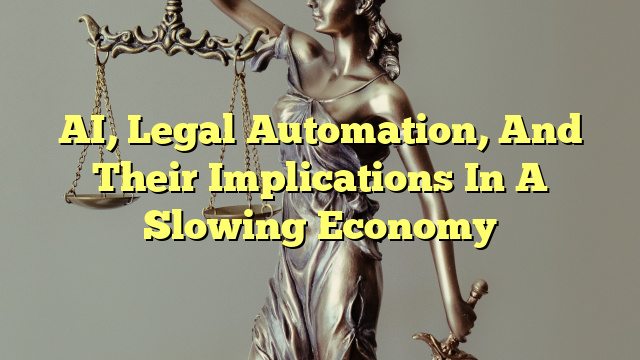Table of Contents
Introduction
Artificial Intelligence (AI) and automation have become increasingly prevalent in various industries, including the legal sector. This article explores the implications of AI and legal automation in a slowing economy.
Artificial Intelligence and the Legal Industry
AI has the potential to significantly impact the legal industry by automating repetitive tasks, enhancing research capabilities, and improving efficiency. With AI-powered tools, legal professionals can streamline document review, contract analysis, and legal research, saving time and resources.
Negative Impacts of Artificial Intelligence (AI)
While AI offers numerous benefits, there are also negative impacts to consider. One concern is the potential job displacement of legal professionals. As AI systems become more advanced, certain tasks traditionally performed by lawyers may be automated, leading to a decrease in demand for human labor.
Furthermore, there are ethical and privacy concerns surrounding the use of AI in the legal industry. AI algorithms are only as good as the data they are trained on, and biases in the data can result in biased outcomes. This raises questions about fairness and justice in AI-powered legal processes.
Automation and Economic Growth
Automation, including AI, has the potential to impact economic growth. On one hand, automation can increase productivity and efficiency, leading to economic gains. By automating repetitive and time-consuming tasks, businesses can allocate resources more effectively and focus on higher-value activities.
However, automation can also lead to job displacement and income inequality. As AI systems take over certain tasks, workers may face unemployment or the need to acquire new skills. This can result in economic hardships for individuals and communities, particularly in a slowing economy.
Negative Impacts of AI on the Economy
In addition to job displacement, AI can have negative impacts on the economy. The initial investment required to implement AI systems and train employees can be costly, especially for small businesses. This financial burden may hinder adoption and limit the potential benefits of AI.
Furthermore, AI can exacerbate income inequality. The benefits of automation are often concentrated in the hands of a few, leading to a widening wealth gap. This can have long-term implications for economic stability and social cohesion.
Conclusion
AI and legal automation have the potential to revolutionize the legal industry, improving efficiency and enhancing research capabilities. However, it is important to consider the negative impacts of AI, such as job displacement and ethical concerns. Additionally, the economic implications of automation must be carefully managed to ensure inclusive growth and mitigate inequality.

